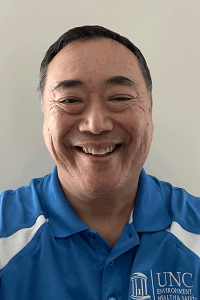Roger Sit
 What is your position at UNC-Chapel Hill, and how long have you been associated with the University?
What is your position at UNC-Chapel Hill, and how long have you been associated with the University?
Chief Radiation Safety Officer for UNC and UNC Hospitals for past 22 years.
How did you initiate your career in this field or what led you to your current position?
I am educated in Nuclear Engineering. After working a few years in and as the nuclear power industry stopped growing in the 1980s, I moved into a parallel industry; radiation protection. This led to a new career as a Health Physicist in universities, hospitals, National Laboratories, and eventually as the Radiation Safety Officer for a large University with a teaching hospital: UNC.
Which sectors of the University does your role impact, and in what ways does it contribute to those areas of work?
My role greatly contributes to the research and patient care sectors of the University and hospitals. There are many regulatory requirements for using radioactive materials and radiation-generating devices in human-use diagnosis, treatment, and research; as well as non-human-use research. Regulatory compliance to state and federal agencies is necessary to maintain licenses and registrations which allow us to continue using the materials and devices.
Describe what you love most about your job.
As a Tier 1 research university, we continue to utilize cutting-edge technology and progressive uses of radiation for research, diagnostics and treatment. It is interesting to continue to apply physics and radiation protection principles to the new technology, especially since the users of the technology focus on the use of the technology as opposed to the safety and regulatory requirements needed for the technology.
What advice do you have for those interested in entering a career in your line of work?
Continue to learn physics, biology and chemistry regardless of your main interest, in the effort to apply the required inter-disciplinary evaluation of safety and regulatory compliance, while supporting the research and clinical trials, involving new technologies and novel use of radioactive materials.
